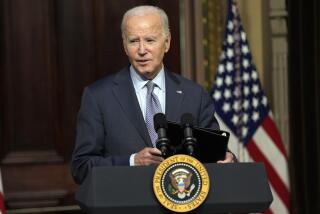Economic Jump-Start Won’t Do
- Share via
Now that President Bush has named his new economic team, he’s expected to turn his attention to a stimulus package. I hope not. Growth, yes. Stimulus, no.
“Stimulus” implies a goose to the economy -- or, more politely, the quick boost you get when you jump-start a dead battery. But this economy doesn’t need a jump-start. While it’s not reaching its potential, it’s far from dead, or even asleep. Over the last 12 months, gross domestic product, or the output of all goods and services, has grown 3.2% -- actually better than the post-World War II average. Unemployment, at 6%, is half a point below the post-1970 average. Inflation is tame, interest rates are low, layoffs are easing and personal incomes and consumer confidence are rising.
Of course, there are problems -- mainly a lack of investment by businesses in plant and equipment and a slump in corporate profits, conditions that in turn threaten the jobs of millions of Americans.
But stimulus wouldn’t help much. The theory of a stimulus package is to put cash in the hands of consumers, who would go out and spend, spend, spend -- which would encourage businesses to invest, invest, invest. The package would focus on demand-side tax cuts.
There are different approaches, but they all amount to sending out rebate checks to Americans, as the government did in 2001, to encourage them to buy things.
But if the economy is truly sick, people will be so scared (and prudent) that they will stash the extra cash in the bank or use it to pay off debt, rather than buy a new dishwasher.
If the economy isn’t so sick, why bother with rebates that simply increase the federal deficit? If businesses believe their sales are rising today because of an emergency one-time tax rebate, why would they want to invest in new plants for next year?
What we need are serious structural changes to the tax code that will promote the kind of economic growth that helps all Americans. The key is private investment -- putting money into technology and other enduring assets that will increase entrepreneurship, employment and prosperity.
Unfortunately, the politics of a growth package aren’t easy because some of the changes have to focus on business taxes and on relief in the upper, as well as the middle and lower, brackets.
Still, there’s a happy precedent. Forty years ago, the U.S. was in the doldrums for similar reasons: national security threats (the Cuban missile crisis) and a big stock market decline.
On Dec. 14, 1962, President John F. Kennedy, a Massachusetts Democrat, urged Congress to “reduce the burden on private income and the deterrents to private initiative which are imposed by our present tax system.”
He asked for “an across-the-board, top-to-bottom cut in personal and corporate taxes” because the system “exerts too heavy a drag on growth, siphons out of the economy too large a share of personal and business purchasing power, [and] reduces the financial incentives for personal effort, investment and risk-taking.”
Wow. I couldn’t have said it better myself. In the end, Congress cut corporate taxes and reduced rates in the top personal bracket by 21 percentage points, igniting the boom of the 1960s -- a tide that, in Kennedy’s phrase, lifted all boats. The budget deficit narrowed and eventually turned to surplus in 1969.
Powerful Kennedy-style tax cuts, not stimulus, are the right recipe today as well.
First, Congress has to increase certainty by making permanent the phaseout in death taxes and the rate cuts enacted last year.
Second, the tax code needs to be simplified by ending the alternative minimum tax, killing special deductions and exemptions and further leveling rates.
Third, business taxes -- which, as economists know, are mainly passed on to consumers -- need serious reform. Three ideas: Lower rates sharply, allow companies to treat purchases of new machines as expenses (writing them off immediately, rather than over many years) and let corporations deduct their dividend payouts.
A true growth package, which must also constrain out-of-control lawsuits and trim regulations that deter risk-taking, is critical in this dangerous age.
As President Kennedy said in 1962: “So long as our national security needs keep rising, an economy hampered by restrictive tax rates will never produce enough jobs or enough profits.”
*
James K. Glassman is a fellow at the American Enterprise Institute and host of the Web site www.TechCentralStation.com.
More to Read
Inside the business of entertainment
The Wide Shot brings you news, analysis and insights on everything from streaming wars to production — and what it all means for the future.
You may occasionally receive promotional content from the Los Angeles Times.










